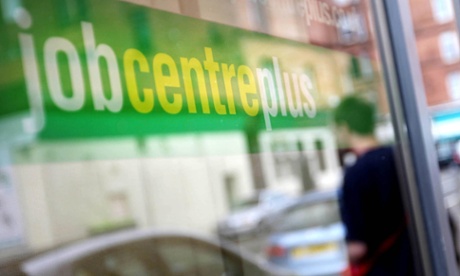
Unemployment fell to a five-year low in April but Britain's workers were squeezed by a dramatic slowdown in pay growth, according to official figures.
A record rise in the number of people in work saw the jobless rate drop to 6.6% in the three months to April, reaching a level last seen in January 2009.
George Osborne hailed the progress as an important step towards the goal of full employment, while the chief secretary to the Treasury, Danny Alexander, said: "Britain is bouncing back."
But the Labour party and trade unions pointed to a fall in workers' standard of living, as the figures also showed that pay growth fell to 0.7%, sharply down from 1.7% the month before and well below inflation, running at 1.8%.
The Trades Union Congress general secretary, Frances O'Grady, said the government had prematurely declared an end to Britain's cost of living crisis. "It's great that more people are joining the workforce but hugely worrying that workers are still not getting the decent pay rises they need to get by.
"The news that the economy is returning to its pre-crash size will be of cold comfort to the millions of workers who are still thousands of pounds a year worse off compared to five years ago.
"With pay rises falling below one per cent, an early interest rise could cause major problems for millions of mortgage holders."
Economists suggested the squeeze, which means pay packets are still falling in real terms, would prove a strong influence on the Bank of England and relieve pressure on the central bank to hike interest rates before next spring.
Ross Walker, UK economist at Royal Bank of Scotland, said anaemic wage inflation trends would persuade the Bank of England to refrain from raising base rates before the end of the year.
John Philpott, director of The Jobs Economist consultancy, said the figures showed the long term unemployed were finding jobs and young people were getting back to work, but pay awards remained very low. "Britain's jobs market is booming everywhere apart from in most people's pay packets," he said.
The fall in wage growth was blamed partly on government changes to the top rate of tax, which encouraged workers in line for large bonuses to take them in April last year. Bonus rises this year are therefore smaller by comparison, dragging down the median average total wage figure in the latest data.
There also remains uncertainty around how much of the growth seen in employment is in low-paid, insecure self-employment or part-time work.
Employment rose by a record 345,000 over the three month period, pushing the number of people in work to 30.54 million, according to the Office for National Statistics (ONS), after a rise which was the highest since records began in 1971.
It means 780,000 jobs have been added in the past 12 months, the biggest annual rise since 1989. Almost half the jobs in that time can be attributed to self employment, though in the last three months full-time employment spurred growth .
The sectors creating the most jobs were agriculture, "real estate activities", the professional, scientific and technical sector and among "people employed by households".
Unemployment fell by 161,000 to 2.16 million, with the jobless rate dropping to 6.6%.
Rob Wood, chief UK economist at Berenberg bank, said pay would recover during the summer and reveal that job shortages in many sectors were forcing employers to raise wages. He predicted that the Bank of England's monetary policy committee would begin to raise rates in November.
The employment minister, Esther McVey said the figures showed businesses were feeling increasingly confident about creating jobs. She said: "Helping young people to get a job is vital to securing our economic future, so it's welcome that youth unemployment has continued to fall – we'll continue to do all we can to inspire the next generation of employers and business leaders and help them to build their careers."
The shadow work and pensions secretary, Rachel Reeves, said: "While this fall in overall unemployment is welcome, working people are over £1,600 a year worse off than when David Cameron came to office and pay has fallen behind inflation."

